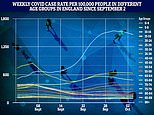Delta Covid variant ‘does not cause more severe disease in children’ than earlier strains
Delta Covid variant does NOT cause more severe disease in children than earlier strains, study finds
Youngsters also do not get any sicker from Delta than they did from Alpha Natural infection produces more memory B cells to fight the virus long-term The B-cells evolve and get stronger for several months after natural infection
<!–
<!–
<!–<!–
<!–
(function (src, d, tag){
var s = d.createElement(tag), prev = d.getElementsByTagName(tag)[0];
s.src = src;
prev.parentNode.insertBefore(s, prev);
}(“https://www.dailymail.co.uk/static/gunther/1.17.0/async_bundle–.js”, document, “script”));
<!–
DM.loadCSS(“https://www.dailymail.co.uk/static/gunther/gunther-2159/video_bundle–.css”);
<!–
The Delta variant does not appear to cause more severe disease in children than earlier forms of the virus.
Earlier this year, the research team found the Alpha variant of the virus did not appear to make children sicker than the original form of the virus, first seen in China.
New data suggests that youngsters also do not get any sicker from Delta than they did from Alpha.
Researchers compared two groups of school-age children with Covid in England.
They looked at 694 children infected with the Alpha variant between late December 2020 and early May 2021, and 706 infected with Delta between late May and early July.
The study published in medRxiv ahead of peer review showed children infected with Delta had slightly more symptoms.
But in both groups, very few children needed to be hospitalised and long periods of illness were uncommon.
In both groups, half of the children were sick for no more than five days.
The Delta variant does not appear to cause more severe disease in children than earlier forms of the virus
Graph shows: The Covid case rate per 100,000 in different age groups in England over the last month
The researchers lacked information on differences between the groups that might have influenced the results, such as whether lockdowns were in place, and the effects of different seasons.
‘Our data suggest that clinical characteristics of Covid due to the Delta variant in children are broadly similar to Covid due to other variants,’ the researchers concluded.
That appears to jibe with data reported by the US Centers for Disease Control and Prevention (CDC).
‘Although we are seeing more cases in children … these studies demonstrated that there was not increased disease severity in children,’ CDC Director Dr Rochelle Walensky said of the Delta-driven wave in a statement.
‘More children have Covid because there is more disease in the community.’
It comes after a separate study showed natural Covid infection produces a stronger secondary immune response than the vaccine.
Important components of the body’s immune response called memory B cells continue to evolve and get stronger for at least several months, producing highly potent antibodies that can neutralise new variants of the virus.
By comparison, vaccine-induced memory B cells are less robust, evolving for only a few weeks and never ‘learning’ to protect against variants.
Covid vaccines do induce more antibodies than the immune system does after a coronavirus infection.
But the immune system response to infection appears to outshine its response to vaccines when it comes to memory B cells.
Regardless of whether antibodies are induced by infection or vaccine, their levels drop within six months in many people.
But memory B cells stand ready to produce new antibodies if the body encounters the virus.
Prior to this study, there had been little data on how vaccine-induced B cells compare to infection-induced B cells.
The researchers caution that the benefits of stronger memory B cells after infection do not outweigh the risks that come with Covid.
‘While a natural infection may induce maturation of antibodies with broader activity than a vaccine does, a natural infection can also kill you,’ said study leader Michel Nussenzweig of Rockefeller University, in a statement.
‘A vaccine won’t do that and, in fact, protects against the risk of serious illness or death from infection.’
![]()


